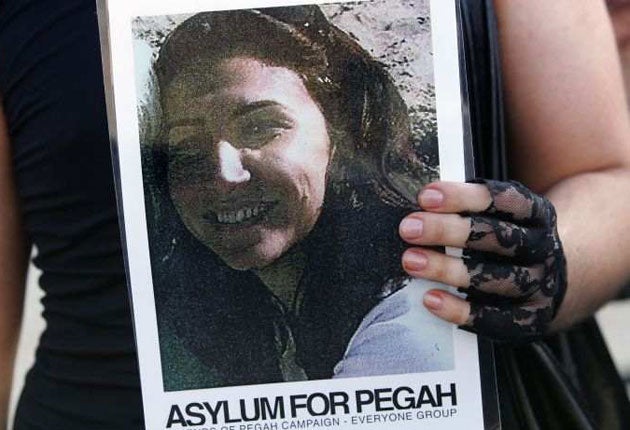Asylum for lesbian on the run from Iran
After a four-year campaign, a woman whose girlfriend was sentenced to death is allowed to stay in Britain

A lesbian who fled Iran after her girlfriend was arrested and sentenced to death in Tehran has won her battle to be granted asylum in Britain.
Supporters of Pegah Emambakhsh, 41, who claimed she would be executed if she was deported back to her homeland, welcomed the Government's change of heart last night after their hard-fought, four-year campaign.
Ms Emambakhsh came to the UK in 2005 fearing for her life, but last year she lost a court battle to stay in this country. Following a high-profile campaign involving gay rights groups, MPs and The Independent, the Home Secretary, Jacqui Smith, agreed to reconsider her case.
Yesterday, Lesley Boulton, of the Friends of Pegah campaign group, said: "We have just heard that Pegah has finally been granted refugee status in the UK. This is fantastic, wonderful news and a great reward for all the hard work put in to ensure she was not sent back to Iran – so thank you, thank you, thank you. This has been a long struggle but it is a real vindication of what can be achieved when we all work together."
The case is the second victory by a gay Iranian seeking sanctuary in the UK. In May last year, Mehdi Kazemi, a 20-year-old student, was granted asylum after his supporters said he also faced the death penalty if sent home. Mr Kazemi came to London to study in 2005 but in April 2006 discovered that his partner had been arrested in Iran and had named Mr Kazemi as his boyfriend before being executed.
Asylum rights groups have been pressing the British Government to introduce a moratorium on returning gay and lesbian refugees to Iran, where homosexuality is still considered a crime. But the Home Office made clear last night that it was not prepared to grant a blanket exemption in such cases. A spokesman for the UK Border Agency said: "We consider each case on its individual merits and, whenever someone needs our protection, we grant it. We constantly monitor the human rights situation in countries like Iran and press for an end to abuses, but we do not believe that everyone claiming to be a homosexual from Iran is in need of international protection."
Under Iran's strict Islamic laws, lesbians found guilty of sexual relations can be sentenced to 100 lashes, but for a third offence the punishment is execution. Ms Emambakhsh came to the UK after her partner was arrested and sentenced to death by stoning. Speaking through her asylum representative in Sheffield, Ms Emambakhsh said at the time: "I will never, never go back. If I do, I know I will die."
She narrowly avoided deportation in August 2007 when her constituency MP, Richard Caborn, and other parliamentarians persuaded the Government to allow her to stay while further legal avenues of appeal were explored. Ms Emambakhsh was already on her way to Heathrow when she learnt of her last-minute reprieve. But last year the Court of Appeal turned down her request for a full hearing. Ms Emambakhsh said she was "very disappointed" by the ruling but planned to apply for a judicial review at the High Court.
Emma Ginn, of the asylum campaign group Medical Justice, said last night: "Pegah being granted refugee status begs the question of why she was ever detained in the first place. She is not an isolated case; 40 per cent of those detained were later released into the community, which suggests that immigration detention is often inappropriate and unnecessary."
Medical Justice claimed that despite a 72 per cent fall in asylum claims between 2002 and 2007, there had been 106 per cent increase in the number of people detained. "The average estimated cost of immigration detention, including overheads, for one week is £1,230 per person. But of course, it is detainees like Pegah who pay the highest price in terms of human misery and worsening health," it said.
Join our commenting forum
Join thought-provoking conversations, follow other Independent readers and see their replies
Comments
Bookmark popover
Removed from bookmarks